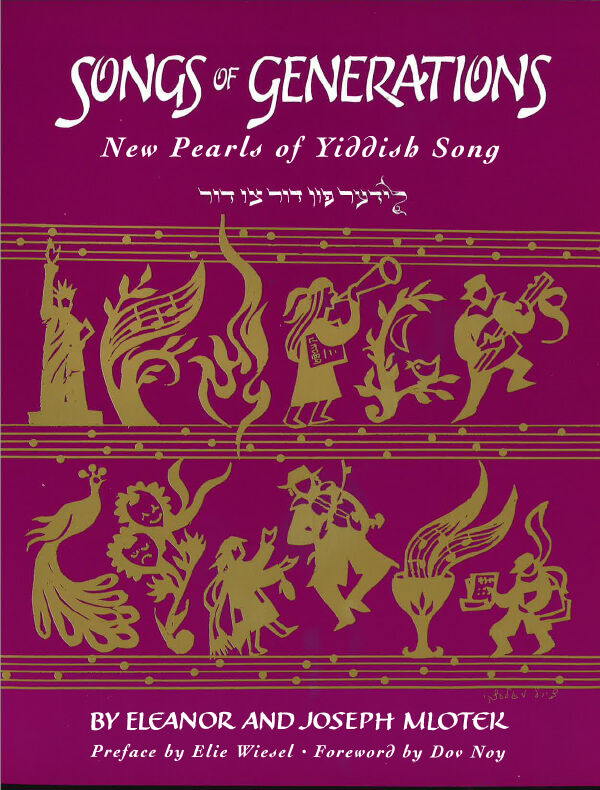The pogrom in Kishenev in 1903 evoked a number of laments. This song, originally titled “Hot rakhmones oyf di milkhome-korbones” (Have Pity on the War Sufferers) was written by Simon S. Frug (1860-1916), music by Abraham M. Bernstein (1865-1932), published in Der fraynd, St. Petersburg (Supplement no.142, June 28, 1903:5-6).
When news about the Kishinev pogrom broke, in this country, the three-year-old actress Stella Adler stood on the stage of her father Jacob P. Adler’s theater and recited this poem. After she finished, her father came down from the platform and went through the audience with his tophat in hand, repeating the last lines. “People wept and emptied their pockets. Women with no money to give threw their wedding rings in his hat.” (Lulla Rosenfeld, Bright Star of Exile, Jacob Adler and the Yiddish Theater, N. Y. , 1977). Other melodies to the poem were written by Henry A. Russotto, Nathan Spector, Henry Lefkowitch, A. Garfinkel and Herman S. Shapiro. An anonymous song of the Kishenev pogrom was published in Mir Trogn A Gezang.

Streams of blood and rivers of tears,
boil, flow deep and broad…
Our old, great misfortune
has stretched out its hand over us.
Do you hear the mothers wailing,
and the screaming of children?
The dead lie in the streets,
and the sick and wounded fall next to them.
Brothers, sisters, take pity!
Great and terrible is the need,
give, so the dead may have shrouds,
give, bread for the living!
Streams of blood and rivers of tears,
boil, flow deep and broad…
A deathly fright is looking in the window
and hunger is banging on the door…
Our hand is feeble to fight,
Strong and heavy is our pain…
Come on, you, with comfort and love,
you good, warm, Jewish heart!
Shtromen blut un taykhn trern
Zidn, flisn tif un breyt.
Undzer alte, groyser umglik
Hot zayn hant oyf undz farshpreyt.
Hert ir dort vi muters klogn
Un fun kinder dos geshrey?
Toyte lign in di gasn,
Kranke fain nebn zey
Refrain:
Brider, shvester, hot rakhmones!
Groys un shreklekh iz di noyt,
Git di toyte oyf takhrikhim,
Git di lebedike broyt!
Shtromen blut un taykhn trern
Zidn, flisn on a shir.
Eymes-moves kukt in fentster
Un der hunger klapt in tir.
Shlaf iz undzer hant tsu shtraytn,
Shtark un shver iz undzer shmarts.
Kum zhe, du, mit treyst un libe,
Gutes, heyses, yidish harts!
שטראָמען בלוט און טײַכן טרערן
זידן, פֿליסן טיף און ברײט. . .
אונדזער אַלטער, גרױסער אומגליק
הערט זײַן האַנט אױף אונדז פֿאַרשפּרײט.
הערט איר דאָרט ױ מוטערס קלאָגן
און פֿון קינדער דאָס געשרײ?
טױטע ליגן אין דו גאַסן,
קראַנקע פֿאַלן נעבן צײ.
רעפֿרײן:
ברידער, שװעסטער, האָט רחמנות!
גרױס און שרעקלעך איז די נױט;
גיט די טױטע אױף תּכריכים,
גיט די לעבעדיקע ברױט!
שטראָמען בלוט און טײַכן טרערן
זידן, פֿליסן אָן א שיעור.
אימת-מװת קוקט אין פֿענצטער
און דער הונגער קלאַפּט אין טיר.
שלאַף איז אונדזער האַנט צו שטרײַטן
שטאַרק און שװער איז אונדזער שמאַרץ.
קום זשע, דו, מיט טרײסט און ליבע,
גוטעס, הײסעס, ייִדיש האָרץ!
Song Title: Lid Fun Kishenever Pogrom

The Songs of Generations: New Pearls of Yiddish Song anthology comprises songs that were either never printed before or appeared in rare and inaccessible publications — sometimes in different versions and without proper sources. Most of the songs in this book were submitted by readers of Chana and Yosl’s column “Perl fun der yidisher poezye” (Pearls of Yiddish Poetry) in the Yiddish newspaper Der Forverts (The Forward), initiated in October, 1970. Over 25 years, thousands of songs were collected in correspondence and on cassettes from readers throughout the world, and they represent a veritable national Yiddish song archive. Chana Mlotek, in her introduction, writes, “In the course of years the inquiries, contributions and enthusiasm of these readers have kept our own interest unflagging and have reinforced our dedication to this effort. And in recent years our participants have also been augmented by new readers from the former Soviet Russia, who receive our newspaper there or from newly-arrived immigrants in this country and Israel.”